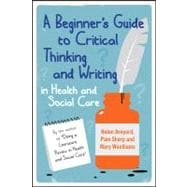
| About the authors | p. viii |
| Introduction | p. 1 |
| What is 'critical thinking' and why is it important? | p. 5 |
| In this chapter we will: | |
| Introduce and define critical thinking and say why it is important. | |
| Give an example of critical thinking in action. | |
| Introduce 'six questions to trigger critical thinking'. | |
| Explore why critical thinking has become more important in recent years. | |
| Explore how critical thinking can help you in your academic assignments and professional decision-making. | |
| How you can think more critically about information that is readily available | p. 25 |
| In this chapter we will: | |
| Identify what is readily available information. | |
| Discuss how to judge the quality and usefulness of this information. | |
| Show how you can begin to think critically about the information you find and how to use it. | |
| Being more critical: how you can find the 'best available' evidence | p. 37 |
| In this chapter we will: | |
| Explain why you need to dig a little deeper to find the æbest available' evidence. | |
| Explore the value of using specific databases to search for evidence, and examine how to plan and search for evidence using specific databases. | |
| Discuss how to find the best available evidence. | |
| Discuss what type of research you should look for and how you know when you have found it. | |
| How you can demonstrate your critical thinking skills in your written work and presentations | p. 64 |
| In this chapter we will: | |
| Discuss why it is important to incorporate critical flunking into your writing and presentations. | |
| Discuss how you can recognize good critical writing and presentations. | |
| Identify when you will need to incorporate critical thinking into your writing and presentations. | |
| Explain how you can plan your written work and presentations effectively. | |
| Discuss how you can present your critical thinking skills effectively in your writing and presentations. | |
| How you can adopt critical thinking in your professional practice | p. 88 |
| In this chapter we will: | |
| Discuss the context and complexity of critical thinking in professional practice. | |
| Explore how you can think critically about routine, relying on your experience and learning from others. | |
| Discuss how you can identify and use skills for critical thinking within your practice. | |
| Examine how you can develop a more in-depth approach to critical thinking. | |
| Enable you to identify whether your workplace/placement has a critical approach to learning and development and discuss how to influence it. | |
| Shaping the future: what is the role of critical thinking in the development of health and social care services? | p. 118 |
| In this chapter we will: | |
| Explore why critical thinking is important for developing a broader perspective in your personal, professional and academic life. | |
| Discuss the changes influencing health and social care in the twenty-first century, and explore ways to respond to these as a critical thinker. | |
| Describe what qualities and skills are needed to think critically from a broader perspective in relation to health and social care. | |
| Discuss how you can broaden your horizons through networking with professionals and academics in different disciplines, professions and specialist fields. | |
| Appendix: useful websites | p. 142 |
| Glossary | p. 145 |
| References | p. 148 |
| Index | p. 154 |
| Table of Contents provided by Ingram. All Rights Reserved. |
The New copy of this book will include any supplemental materials advertised. Please check the title of the book to determine if it should include any access cards, study guides, lab manuals, CDs, etc.
The Used, Rental and eBook copies of this book are not guaranteed to include any supplemental materials. Typically, only the book itself is included. This is true even if the title states it includes any access cards, study guides, lab manuals, CDs, etc.